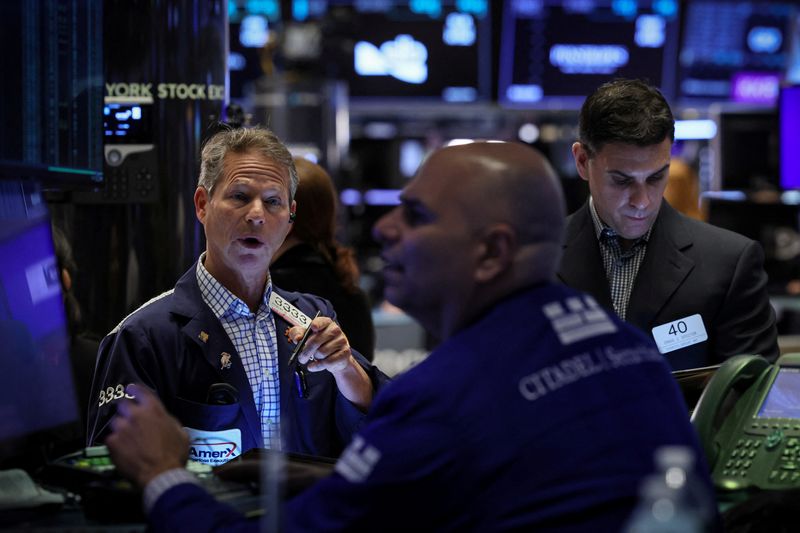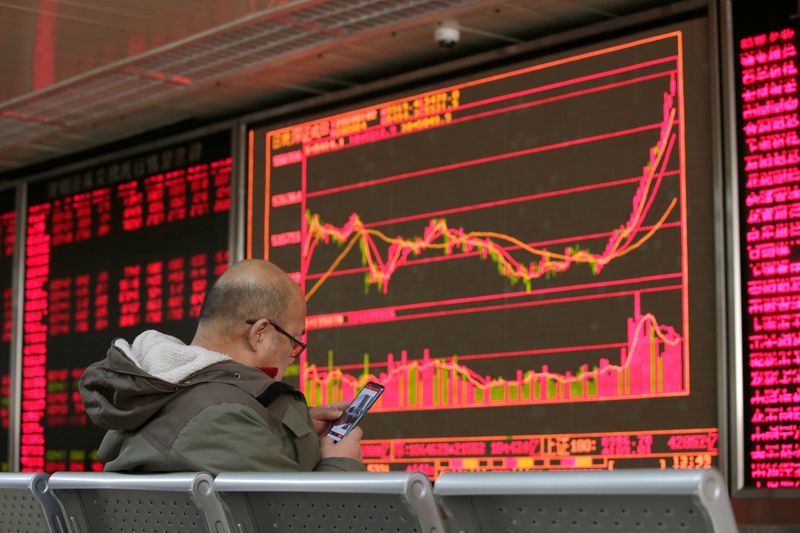By Sinéad Carew and Amanda Cooper
NEW YORK/LONDON (Reuters) -Global stocks rose on Thursday while the euro fell as Europe's central bank kept rates unchanged, and U.S. Treasury yields declined after data showed the U.S. economy grew more quickly than expected in the fourth quarter.
The U.S. economy grew as strong consumer spending defied recession predictions in 2023, with fourth quarter gross domestic product (GDP) increasing at a 3.3% annualized rate and full-year growth at 2.5%, according to the Commerce Department.
The U.S. dollar rose on Thursday as the data suggested that the Federal Reserve would be in no rush to cut interest rates.
But the euro fell to a new six-week low of $1.08215 against the dollar. The European Central Bank kept interest rates unchanged at a record-high 4% and ECB President Christine Lagarde said it was "premature to discuss rate cuts" but noted that risks to economic growth are "tilted to the downside."
"Probably why you're seeing weakness in the euro is the differential between European growth rates and U.S. growth," said Chris Zaccarelli, chief investment officer at Independent Advisor Alliance in Charlotte, North Carolina.
With the S&P 500 clocking its fifth consecutive closing record high, Wall Street investors were showing some relief that the U.S. economy was holding up better than hoped. Peter Cardillo, chief market economist, Spartan Capital Securities, New York said the numbers "bode well for a soft landing."
“Bottom line it’s a good report but it will likely induce the Fed to keep interest rates steady at least until the third or fourth quarter of 2024,” Cardillo said.
"The consumer is still spending and that bodes well for corporate America. The market’s focus is on inflation and the consumer.”
The Dow Jones Industrial Average rose 242.74 points, or 0.64%, to 38,049.13, the S&P 500 gained 25.61 points, or 0.53%, to 4,894.16 and the Nasdaq Composite gained 28.58 points, or 0.18%, to 15,510.50.
At 4:14 p.m. ET (214 GMT) the MSCI world equity index, which tracks shares in 49 nations, was up 0.32%%. Earlier Europe's STOXX 600 index closed up 0.3%.
Treasury yields fell as investors bid up prices after the data showing faster-than-expected economic growth, along with an inflation pace on track to meet the Fed's 2% target.
The yield on benchmark 10-year Treasury notes fell to 4.128% compared with its U.S. close of 4.178% on Wednesday. The two-year yield, which rises with traders' expectations of higher Fed fund rates, touched 4.3138% compared with a U.S. close of 4.378%.
In currencies, the euro was down 0.4% on the day at $1.0841, having lost 1.77% in a month.
The dollar index, which tracks the greenback against a basket of currencies of other major trading partners, was up 0.21%.
"The dollar overall is stronger today, but given the scope and scale of the GDP beat, I would argue that it should be a lot higher," said Eugene Epstein, head of structuring for North America at moneycorp in New Jersey.
"The market, even in the face of all this information that the economy is growing well, still does not buy the higher-for-longer premise that the Fed has given."
The dollar rose 0.16% against the yen to 147.73. This was after the yen on Wednesday staged its largest one-day rally against the dollar in a month after hints of rate increases to come in Japan.
In commodity markets, U.S. oil prices rose on Thursday to the highest since late November following the U.S. data, and as tensions in the Red Sea kept disrupting global trade.
West Texas Intermediate crude futures settled up 3%, or $2.27 at $77.36 a barrel. Brent crude finished up 2.99%, or $2.39, at $82.43. [O/R]
In precious metals, spot gold prices rose 0.32% to $2,019.11 an ounce.

Earlier, China markets had surged on the back of revived investor confidence that helped offset a more muted performance elsewhere, while the euro held steady against the dollar ahead of a European Central Bank meeting.
Chinese blue-chips staged a robust rally, with the Shanghai Composite closing up 3% in its largest daily gain in nearly two years, after a series of measures by Beijing authorities to prop up the economy and the stock market.
